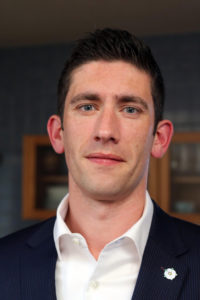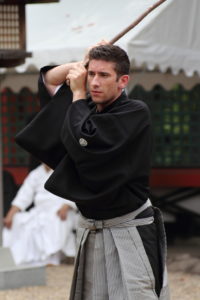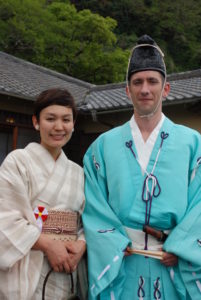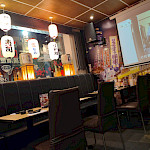3 Feb 2024
JETAA News
31st March 2017
JET Spotlight: Alex Bradshaw
After finishing his placement on the JET Programme, in Kyushu’s Kagoshima Prefecture, Alex Bradshaw chose to stay in the area. His passion for Japan and furthering UK–Japan relations has led him on an exciting career journey, from entrepreneurship and logistics to media, translation and marketing. He told Jetlag his story and what the future might hold.
 What inspired you to join the JET Programme?
What inspired you to join the JET Programme?
I found out about JET during university but didn't get around to applying until about five years later. I started working in the IT sector at the tail end of the dotcom boom, which meant there was still a relaxed culture and quite a bit of money floating around, but the rebranding and corporate culture that came in during the mid-2000s made me lose interest.
I was always interested in Japanese culture through Japanese friends of the family, and later became interested in the country’s cinema and martial arts. I already practiced kendo, iaido and a little aikido, and wanted to find out more about the culture behind those practices, so I decided to leave my job and give JET a try.
How did you find your experiences as a JET?
JET was a great education. It was hard at first to work out what the teachers wanted me to do, but I slowly managed to get more involved in the classroom. I came to Kagoshima with zero Japanese ability, but managed to communicate with the teachers and kids, and had a great time teaching them English.
I think I visited about 14 different schools in total, including Kurokami, a school on Sakurajima [an active volcano] with only seven students. I worked at an all-boys high school for a lot of my time on JET, which was great fun.
 Outside of school I got heavily involved in local culture and have been studying a local style of swordsmanship called Jigen-ryu ever since. I also spent a lot of time practicing calligraphy and did a fair bit of zazen as well.
Outside of school I got heavily involved in local culture and have been studying a local style of swordsmanship called Jigen-ryu ever since. I also spent a lot of time practicing calligraphy and did a fair bit of zazen as well.
I got married during my time on JET, and my wife was pregnant with my daughter when I finished the programme. It was a very worrying time not knowing whether to stay in Japan or go back to the UK. Thankfully, the relationships I managed to build while on JET gave me a lot of opportunities to continue working in Kagoshima.
What have you been doing since finishing JET?
I've had plenty of different jobs. I started an English conversation school in Kagoshima City. For the first six months it was tough getting students to join, so I worked temporarily as an overseas coordinator for the Renshinkan World Karate Tournament to make ends meet. I had to get visas, accommodation, flights, and also provide funding for about 120 participants from 10 countries.
After the competition my school started to take off and I was employed by The International University of Kagoshima and Kagoshima University as a contract lecturer. For two years I also was a reporter for a local TV station.
My school grew to around 120 students and we opened a second branch. I also did a lot of translation and interpretation work. I got together a group of highly motivated people and we started putting on TED and PechaKucha events in Kagoshima in 2013.
I started doing some contract work for Shimadzu Limited in 2014, mainly providing translations for signage and menus, but also advising on the direction of their website and a few other things. I was headhunted by them from my company in mid-2015, and sold my English School to an American teacher who was working for me at the time. I’m just finishing my first year with Shimadzu, and it's been a great experience so far.
How do you think your current role can further UK-Japan ties?
Shimadzu is an interesting company in that our mission is not only to be economically viable, but also to preserve the history and culture of Satsuma [largely modern-day Kagoshima Prefecture] and 800 years of the Shimadzu family.
 The historical ties between the UK and Satsuma make it a natural choice to start overseas promotion of Sengan-en, a traditional Japanese garden and stately home in Kagoshima that has been passed down in the Shimadzu family for over 350 years.
The historical ties between the UK and Satsuma make it a natural choice to start overseas promotion of Sengan-en, a traditional Japanese garden and stately home in Kagoshima that has been passed down in the Shimadzu family for over 350 years.
The 30th head of the family, Tadashige, was educated by a British governess called Ethel Howard. Her book is available online for free: https://archive.org/details/japanesememories00howarich
Thanks to Kagoshima's role in the Anglo–Japanese Alliance, many of the key figures in UK–Japanese relations have visited Sengan-en at some point, so we are aiming to use these historical ties to promote interest in Japan in the UK and vice versa.
We are also working to cater better for Western visitors, without hindering immersion in the “Japanese experience.” I really want people from the UK to come and enjoy an authentic side of Japan that I am worried is disappearing with the rise of inbound tourism.
Finally I am trying to get Kagoshima people interested in visiting the UK, and am hoping to hold some British-themed events here at Sengan-en in the future.
What are your professional and personal Japan-related goals?
I hope to continue my study of traditional Japanese culture. This has become both a personal and professional goal, as we have a lot of traditional events at Sengan-en. Our goal at Shimadzu is not to forget the spirit at the centre of these traditions and to keep them alive in more than just form alone.
I also intend to make a receptive environment for guests from overseas and raise the profile of Kagoshima as a world class destination. However, I am aware of the footprint of mass tourism and am determined to protect the cultural heritage of Kagoshima. I really believe that Kagoshima has the resources to cater for both casual tourists and those with a real desire to find deep cultural connections with Japan.









